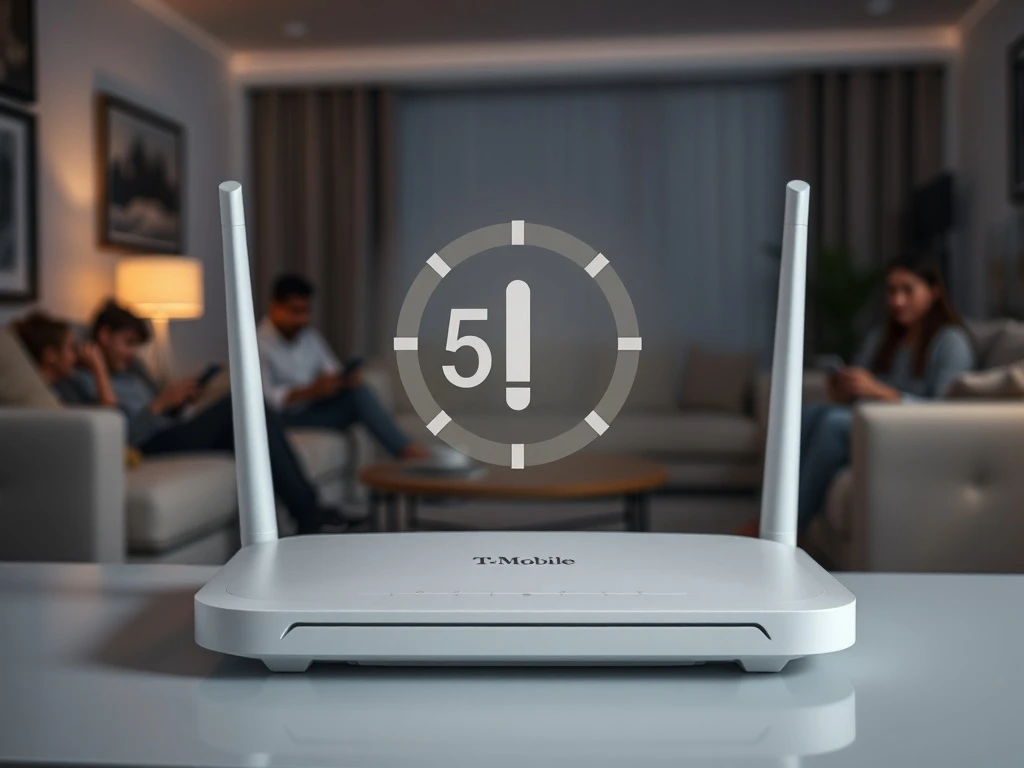For many consumers, reliable home internet is a crucial utility. T-Mobile, a significant player in the wireless home internet market, recently made changes to its T-Mobile Internet Plans. These adjustments, implemented quietly, could impact countless households across the nation. Understanding these modifications is essential for current and prospective customers. This article explores the specifics of these updates, their potential implications, and what subscribers should know.
Understanding the Shift in T-Mobile Internet Plans
T-Mobile has subtly revised the terms of its T-Mobile Internet Plans. Previously marketed as truly unlimited, many plans now include a ‘Fair Usage Policy.’ This policy introduces a new dynamic for high-data users. Essentially, it means that while data remains technically unlimited, speeds may be significantly reduced after a certain threshold. This deprioritization primarily occurs during peak network congestion.
The telecommunications giant did not widely publicize these changes. Instead, they appeared in updated terms and conditions documents. This approach left many customers unaware until they potentially experienced slower speeds. Consequently, many users feel surprised by the sudden shift. This new policy marks a notable departure from T-Mobile’s prior unlimited data assurances for its home internet offerings.
Key aspects of the revised policy include:
- Deprioritization Threshold: After exceeding a specific data usage (often 1.2 TB or 1.5 TB per billing cycle), users may experience slower speeds.
- Congestion-Based Slowdowns: These slowdowns occur primarily when the network experiences high traffic, not continuously.
- Network Management: T-Mobile asserts these measures are for network management, ensuring fair access for all users.
This development requires immediate attention from anyone relying on T-Mobile Internet Plans for their daily online activities.
Unpacking the New Fair Usage Policy for T-Mobile Internet Plans
The introduction of a ‘Fair Usage Policy’ fundamentally alters the landscape of T-Mobile Internet Plans. Previously, the promise of truly unlimited data attracted many customers. Now, that promise comes with an asterisk. This policy outlines conditions under which T-Mobile may manage network resources. For high-volume users, this means a potential downgrade in service quality during busy hours.
For instance, a household with multiple streamers, gamers, and remote workers might easily hit the data threshold. Once they exceed this limit, their internet speeds could drop significantly during evenings or weekends. This situation contrasts sharply with the expectation of consistent, high-speed connectivity. Therefore, understanding the implications of this policy is crucial for managing your online experience.
Many industry analysts view such policies as a way for providers to manage network strain. As more people adopt wireless home internet, demand on existing infrastructure grows. However, transparency remains a key concern. Customers expect clear communication regarding any changes to their subscribed T-Mobile Internet Plans.
Consider these points regarding the new policy:
- Impact on Streaming: High-definition and 4K streaming consumes substantial data. Users might face buffering after reaching the threshold.
- Gaming Latency: Online gaming requires low latency. Deprioritization could lead to increased lag, affecting gameplay.
- Work-From-Home: Video calls and large file transfers can be disrupted if speeds are throttled during critical work hours.
This shift emphasizes the importance of monitoring data usage, even on supposedly unlimited plans.
Impact on Existing and New T-Mobile Internet Plans Customers
The changes to T-Mobile Internet Plans affect both current subscribers and those considering signing up. Existing customers might suddenly notice performance issues they hadn’t experienced before. This can be particularly frustrating for individuals who chose T-Mobile specifically for its unlimited data promise. Many signed up under the assumption that their speeds would remain consistent regardless of usage.
New customers, conversely, enter into these terms from the outset. They might not have the same expectations of ‘true unlimited’ as early adopters. However, the lack of prominent disclosure could still lead to dissatisfaction. They might only discover the limitations after signing up and beginning to use the service extensively. Consequently, this could lead to a negative customer experience from the start.
Moreover, these changes can influence consumer trust. When a provider quietly alters core service terms, it can erode confidence. Customers prefer clear, upfront communication about any modifications to their T-Mobile Internet Plans. This ensures they can make informed decisions about their internet service provider.
The financial implications also bear consideration. While the core monthly price for existing users might not change, the perceived value of the service diminishes. For new customers, there might be subtle price adjustments alongside the new policy. This combination makes comparing T-Mobile’s offerings with competitors more complex.
Why Are T-Mobile Internet Plans Changing Now?
Several factors likely contribute to the quiet changes in T-Mobile Internet Plans. The wireless home internet market has grown significantly. More households are opting for 5G home internet as an alternative to traditional cable or fiber. This increased adoption puts considerable strain on network infrastructure. Therefore, network management becomes a critical operational necessity for providers.
Furthermore, T-Mobile aims to maintain a competitive edge. Offering truly unlimited, unthrottled data can be expensive. By implementing a fair usage policy, the company can better manage costs associated with network expansion and maintenance. This strategy helps them sustain profitability while continuing to attract new subscribers with competitive pricing.
Another reason could involve strategic positioning. As 5G technology evolves, so does the capacity of wireless networks. However, current capabilities might not always keep pace with rapidly escalating data demands. Introducing usage thresholds allows T-Mobile to balance current network capacity with future growth plans. It also enables them to prioritize certain types of traffic or ensure a baseline experience for all users.
Ultimately, these adjustments reflect a broader industry trend. As wireless internet becomes a primary connectivity solution, providers must adapt their business models. They must balance consumer expectations for unlimited data with the practicalities of network capacity and financial sustainability. Therefore, these changes, while potentially unwelcome, are not entirely surprising in the rapidly evolving telecom landscape.
Navigating Your Options with T-Mobile Internet Plans
Given the recent changes to T-Mobile Internet Plans, current and prospective customers should evaluate their options. First, review your current plan’s specific terms and conditions. Look for details regarding the Fair Usage Policy and any stated data thresholds. Understanding your individual plan’s specifics is the first step toward managing potential impacts.
If you find your household frequently exceeds the data threshold, consider adjusting your usage habits. This might involve downloading large files during off-peak hours or reducing video streaming quality. Alternatively, explore T-Mobile’s customer support channels. They might offer different plan tiers or solutions that better suit your data consumption needs. Always ask specific questions about data caps and deprioritization.
Moreover, do not hesitate to compare T-Mobile Internet Plans with other available options. Many regions now have multiple internet service providers, including cable, fiber, and other wireless providers. Researching alternatives can provide leverage. You might find a competitor offering truly unlimited data or a plan better suited to your usage patterns. Always compare speeds, pricing, and terms carefully.
Ultimately, staying informed empowers you to make the best decision for your home internet. Do not assume your service will remain unchanged indefinitely. Proactively managing your connectivity ensures you receive the value you expect from your internet provider. This vigilance is key in today’s dynamic telecommunications market.
The Future of T-Mobile Internet Plans and Wireless Connectivity
The recent adjustments to T-Mobile Internet Plans signal a potential shift in the broader wireless home internet market. As demand for 5G home internet grows, providers may increasingly implement similar fair usage policies. This trend could reshape consumer expectations regarding ‘unlimited’ data. It highlights the ongoing challenge of balancing network capacity with burgeoning data consumption.
Furthermore, this situation underscores the importance of infrastructure investment. To truly support widespread, high-speed, unlimited wireless internet, significant capital must flow into network expansion and technological advancements. Without this, deprioritization policies may become more common. This could impact everything from streaming entertainment to remote work capabilities for millions.
Consumers will likely become more discerning. They will demand greater transparency from providers regarding data policies. The quiet nature of T-Mobile’s changes might lead to increased scrutiny from consumer advocacy groups and regulators. This could push providers towards clearer communication strategies in the future.
Ultimately, the landscape of home internet remains dynamic. T-Mobile’s move is a reminder that even seemingly stable services can change. Staying abreast of these developments helps consumers navigate their options effectively. The future of T-Mobile Internet Plans, and wireless internet in general, depends on a delicate balance between innovation, capacity, and clear consumer communication.
Frequently Asked Questions (FAQs)
What exactly changed with T-Mobile Internet Plans?
T-Mobile has introduced a ‘Fair Usage Policy’ for many of its home internet plans. This means that while data is technically unlimited, your speeds may be deprioritized, or slowed down, after you exceed a certain data usage threshold (often 1.2 TB or 1.5 TB) during periods of network congestion.
How do I know if my T-Mobile Internet Plan is affected?
These changes typically apply to newer plans or are being phased in. You should review your specific plan’s terms and conditions or contact T-Mobile customer service directly. Look for details regarding ‘Fair Usage Policy’ or ‘network management’ clauses.
Will these changes cost me more money?
For existing customers, the core monthly price generally remains the same. However, new sign-ups might see slightly adjusted pricing. The primary ‘cost’ is a potential reduction in service speed and quality after hitting the data threshold, especially during peak usage times.
What can I do if my internet speeds slow down due to deprioritization?
If you experience slowdowns, try reducing high-bandwidth activities like 4K streaming or large downloads during peak hours. You can also contact T-Mobile to inquire about your data usage or alternative plans that might better suit your needs. Exploring other internet providers in your area is another option.
Why did T-Mobile make these changes quietly?
The reasons are not explicitly stated, but companies sometimes make policy adjustments without broad public announcements to manage customer expectations and avoid immediate backlash. These changes are often framed as ‘network management’ strategies to ensure service quality for all users as network demand increases.
Are other wireless home internet providers doing this?
Some other wireless home internet providers also have similar fair usage or network management policies, though the specifics vary. As wireless internet becomes more popular, such policies may become more common across the industry to manage network capacity and demand.






